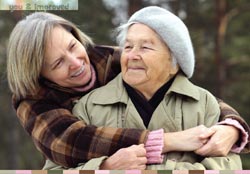(This is an excerpt of an article written for Kim & Jason magazine by Marg Forbes, CEO of The Forbes Solution. Marg combines her accounting acumen and her emotional intelligence skills to make numbers less intimidating and more meaningful for small business owners.)
 My mom was 39 when I was born, and although I was a “surprise”, I’ve always felt wanted, loved and cherished. She had three other children, but I was always her baby. When I lived at home, I never went to sleep without a goodnight kiss. When I moved away, I talked to her on the phone or visited her every day.
My mom was 39 when I was born, and although I was a “surprise”, I’ve always felt wanted, loved and cherished. She had three other children, but I was always her baby. When I lived at home, I never went to sleep without a goodnight kiss. When I moved away, I talked to her on the phone or visited her every day.
Over the past few years, on my visits home, I’ve noticed my mom’s health gradually declining. This spring, just before she turned 86, we realized that she wouldn’t be able to stay in her home much longer; by fall she had found a place in a seniors’ facility.
I spent several weeks with my mom this summer, helping her cope with the reality that she needed constant care. More than once, it struck me how the tables had turned. Whereas forty some years ago, she had been helping me grow from dependence to independence, now I was helping her make the opposite transition.
For me, caregiving has been an emotionally, physically and spiritually draining experience. Many days I felt like I was losing my best friend. Afternoons of shopping and eating out, and evenings of playing cards were replaced by innumerable visits to various health professionals and emergency rooms. Whereas we used to talk about life’s joys and troubles, our conversations now focused mainly on my mom’s failing faculties. Many times she would say to me, “Growing old is not for the faint of heart!”
While sitting in waiting rooms holding mom’s hand, or watching her sleep in a hospital bed, I’d often find myself fascinated by the children who were also there, tagging along with mom or dad, or visiting their grandparents. I was reminded of some of the simple things I learned when I was their age – things that I’d forgotten in the busyness of growing up and becoming an adult.
Kids are happy to see their loved ones. I began to consciously put my troubles aside when I was with my mom. She was no longer my shoulder to cry on. Now, I was supporting her. I hugged her more and talked about things that were positive – the nice nurse, the warm blankets they brought around at night, and how surprisingly good the hospital food was.
Kids want to hear stories. I decided to ask my mom to talk about her life, and listened in a way I’d never had the time or patience to before. Some days she could only tell me parts of the story, but then a few days or a week later, she’d remember more details. It made the time pass quickly, and I learned more every day about myself and my mom.
Kids bring their own toys or make toys out of whatever is available. I decided mom and I should have some fun, too. We played cards with a deck specially made for people with limited eyesight, did crossword puzzles and read trashy magazines together. We laughed like…well, like kids!�
 Like this article?
Like this article?
Well you’re in luck, because you can read the whole thing starting on page 22 in this FREE digital version of Kim & Jason magazine.

You story touches my heart.
I too, found caregiving exhausting, frustrating, and challenging–and like you, I also found that just hanging out with my mom was…comforting. Caregiving taught meso much about myself, my mother, my daughters–about life, love, and quiet strength.
I wrote every day the last three years of my mom’s life–as I shared my home and heart with her–(she had Alzheimer’s and Parknson’s). I wanted to capture “us” just as we were–squabbles, tears, laughter and all.
I have excerpts from my book, Mothering Mother on my website–
http://www.mothering-mother.com, hope you’ll take a look)
~Carol D. O’Dell
Author of Mothering Mother
available on Amazon
Carol,
Yes, I think Marg did a great job on this article. She offered a pretty neat perspective on the whole experience.
Neat book idea, too. I hope our readers who are in a similar situation take a look at your book.